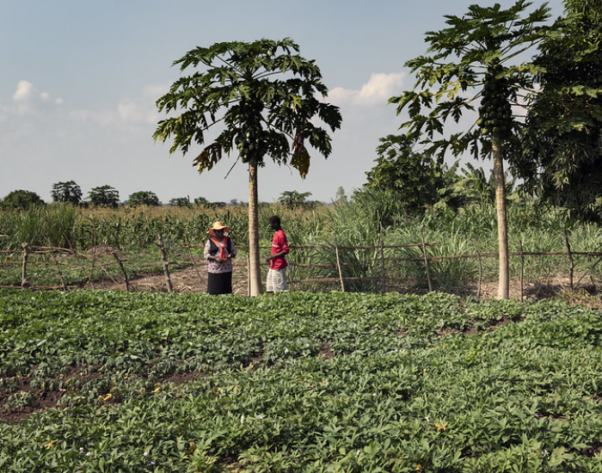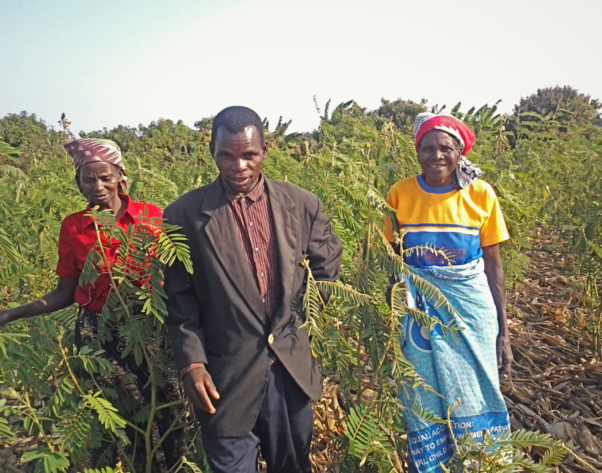 In Malawi—the warm heart of Africa—a constantly changing climate poses a threat to the food, nutrition and income security of small-scale farmers, taking away their smiles. Such farmers, who rely on agriculture entirely for their livelihoods constitute about 80% of the economically active population. Recurrent droughts and floods, declining soil fertility, desertification, and outbreak of pests and diseases are now more rampant.
In Malawi—the warm heart of Africa—a constantly changing climate poses a threat to the food, nutrition and income security of small-scale farmers, taking away their smiles. Such farmers, who rely on agriculture entirely for their livelihoods constitute about 80% of the economically active population. Recurrent droughts and floods, declining soil fertility, desertification, and outbreak of pests and diseases are now more rampant.
Scientific models suggest these adverse climatic conditions will accelerate. Therefore, urgent intervention is needed.
On 22 July the Malawi government, CGIAR centers and the EU, launched the Development of Smart Innovation through Research Agriculture (DeSIRA) project to address climate related challenges affecting farmers. Funded by European Union, the project will develop and promote best farming practices, as well as improved seed and crop varieties among farmers based on evidence from on-station and on farm trials.
According to Jean-Pierre Busogoro, Program Manager, European Union delegation to Malawi, who oversees the initiative, DeSIRA will draw on an already existing strong collaboration between the national research system and CGIAR centers in Malawi. Key partners include eight CGIAR Centers, Malawi’s Department of Agricultural Research Services (DARS), CIRAD and the University of Liège.
“Institutions under DeSIRA will work together to address the complex, diverse and changing constraints through development and dissemination of multidisciplinary and integrated technologies appropriate for Malawi’s agri-food systems” he said during the launch.
Joyce Njoloma from the World Agroforestry Center (ICRAF) noted that the new initiative would focus on integrating Malawi’s cropping systems with indigenous and exotic trees and shrubs to maximize productivity. The approach would include many stakeholders, including small-scale farmers and national agricultural extension agents.
DeSIRA is aligned with Malawi’s agricultural development priorities, and will contribute to sector wide productivity and growth, and national development.
“The project objectives are directly aligned with the Government’s research priorities to address climate change and build sustainable resilience as set-out in Malawi’s National Agricultural Policy and National Agricultural Investment Plan”, said Wilson Makumba, Director of Malawi’s Department of Agricultural Research Services.
 In line with Malawi’s climate change adaptation strategy, DeSIRA will focus on the development of climate-resilient integrated technological innovations. This will involve the development of diversified crop and livestock production systems, robust integrated pest and disease management strategies to predict, monitor and control existing and emerging biotic threats to agriculture, and improve post-harvest management technologies.
In line with Malawi’s climate change adaptation strategy, DeSIRA will focus on the development of climate-resilient integrated technological innovations. This will involve the development of diversified crop and livestock production systems, robust integrated pest and disease management strategies to predict, monitor and control existing and emerging biotic threats to agriculture, and improve post-harvest management technologies.
The discussions further emphasized the importance of integrating gender, critical to the success of the project. The integration of applied and social science in engaging beneficiaries of DeSIRA makes provision for #gender-inclusive learning and refining approaches. This will drive the adoption of technologies developed seeing that in Malawi, women comprise 60% of the small-scale farmers who are also the primary caregivers in the rural households. Ultimately, the project will build resilience of small-scale farmers to the negative impacts of climate change.
DeSIRA is led by the International Potato Center. The other CGIAR centers participating in the project are the: Alliance of Bioversity International and CIAT; International Crops Research Institute for Semi-Arid Tropics; International Food Policy Research Institute; International Institute of Tropical Agriculture; International Maize and Wheat Improvement Center; World Agroforestry Center; and WorldFish.
Read about CGIAR Collaboration in Malawi: Toward an inclusive, healthy, and sustainable Malawi
